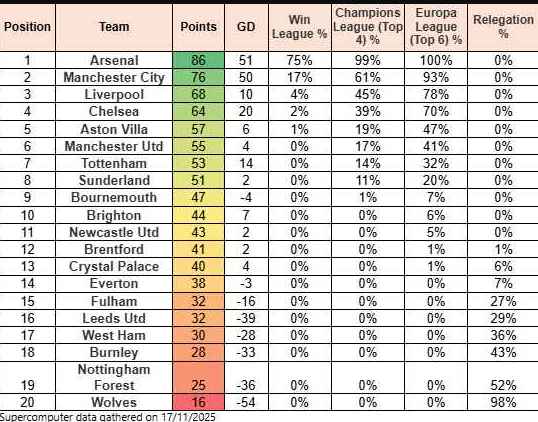Statistics from the latest Supercomputer-predicted Premier League table have backed up Emile Heskey’s claims that the title is “Arsenal’s to throw away”.
Speaking exclusively to Dream Vegas, the former Three Lions striker was confident that the Gunners will secure glory this season. Heskey said: “It’s Arsenal’s to throw away.
“I think there will be some bumps in the road for them, but I can’t see them losing too many games”. He continued: “I don’t think Arsenal will lose a lot from here, because they’ve got a manager who understands the Premier League”.
Now, the latest Supercomputer predictions for the end-of-season Premier League table, provided by Dream Vegas, has shown that Mikel Arteta’s side have a 75% chance of winning the league this season.
Key Supercomputer findings:
- Arsenal are the clear favourites to win the Premier League in 2025/26, doing so in 75% of 10,000 Supercomputer simulations.
- The Gunners are predicted to secure 86 points to clinch the title and will finish 10 points clear of the next-best team, Manchester City, who still have a 17% chance of winning this season’s title.
- Liverpool’s slow start to the season means that the club will finish in 3rdplace after 38 games, with just a 4% chance of winning the Premier League.
- Only Chelsea (4th) and Aston Villa (5th) are also considered to be in the running for the Premier League crown, with 2% and 1% chances of winning the title respectively. While Manchester United (6th) have a 0% chance of winning the league.
- The Supercomputer has identified Wolves, Nottingham Forest and Burnley as this season’s relegated trio.
Supercomputer identifies clear favourite in Premier League title race:
- The Supercomputer has made Arsenal the runaway favourites to win the Premier League in 2025/26. The Gunners finished in first place in 75% of the 10,000 Supercomputer simulations. Mikel Arteta’s side are expected to achieve 86 points overall and have a league-best goal difference of +51 to boot.
- Manchester City are predicted to finish in 2ndplace, with 76 points, a whole 10 behind league leaders Arsenal. However, Pep Guardiola’s side are still in with a 17% chance of returning their status as champions of England.
- Liverpool will finish in 3rdplace and have been given just a 4% chance of defending their title following a slow start to the season, which included a 3-0 defeat to rivals Man City before the international break. A modest goal difference of +10 also indicates that Liverpool’s defensive leaks will not go away over the duration of the season.
- Chelsea are predicted to clinch the final spot in the top four, doing so in 39% of the 10,000 Supercomputer simulations. Enzo Maresca’s side are still considered to be in with an outside chance of winning the league this season too, with the Blues finishing first in 2% of the Supercomputer simulations.
- Just six points separate the 5thand 8th placed teams, but Aston Villa will finish the strongest in this section, earning Europa League football again with 57 points. The Villains are closely followed by Manchester United on 55 points, Tottenham Hotspur on 53 points, and surprise package Sunderland on 51 points.
- The remainder of the top half of the table is taken up by two South Coast clubs with 9thplaced Bournemouth on 47 points, and 10th placed Brighton on 44 points.
- This means that Newcastle United miss out on a place in the top 10 in 2025/26, and the Magpies have been given just a 5% chance of securing Europa League football after 38 games.
- Wolves are still without a win in the Premier League after 11 games, and as such, the Supercomputer predicts that Rob Edwards’ side will finish in dead last. In fact, Wolves were relegated in 98% of Supercomputer simulations.
- They are predicted to be joined by Nottingham Forest (19th), who have a 52% chance of relegation, and Burnley (18th), who have a 43% chance of being relegated. The Clarets’ defeat against West Ham (17th) before the international break may prove very costly indeed, as the Hammers are estimated to claim just two points more than Burnley after 38 games.
The Science Behind the Supercomputer: The supercomputer adopts the Monte Carlo method, at its heart is a Python-based match simulator that uses two Poisson distributions – one for the home team and one for the away team – to anticipate the number of goals each team could score in a match.
A Poisson distribution is a powerful mathematical concept that predicts the probability of a given number of events (in this case, goals) happening in a fixed interval of time. The key input to a Poisson distribution is the 'lambda' (λ) value, which represents the average rate of an event's occurrence.
Let's break this down using an example of Manchester City playing at home against Arsenal:
In our simulator, we first compute the λ for Man City, using both xG (Expected Goals) and actual goals scored per match based on their last 19 home games. This gives us an 'attacking lambda'. For instance, with an xG of 2.24 and actual goals per match of 3.16 whilst playing at the Etihad Stadium, Man City's attacking λ is: 2.7 – both xG and goals are used to measure both underlying and actual performance.
Next, we calculate Arsenal's 'defensive lambda' based on their last 19 away games from their average goals conceded per game (0.95) and xGA (1.2) whilst on the road, giving a value of 1.08.
To tailor these λ values to the specific match-up, we adjust Man City's attacking λ by factoring in the strength of Arsenal's defence. We do this by calculating a multiplier, which is the ratio of Arsenal's defensive λ to the league average defensive λ (1.54).
Multiplying Man City's λ (2.7) by this factor adjusts it for Arsenal's specific defensive strength. This adjusted λ better represents Man City's goal-scoring likelihood against Arsenal. The same process is replicated for the away team.
In formulaic terms:
Home team λ = home team attacking λ * (away team defensive λ / league average away defensive λ)
Away team λ = away team attacking λ * (home team defensive λ / league average home defensive λ)











